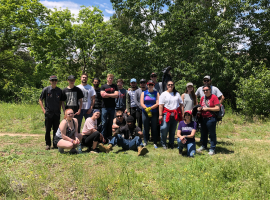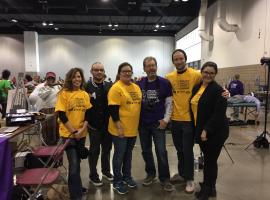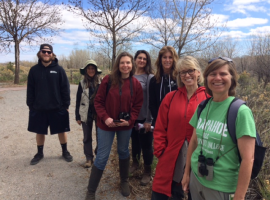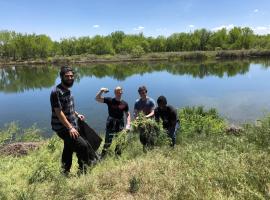
Service Learning
Put what you learn in the classroom to work in the real world and develop into an active, committed, and informed citizen through Service Learning at ACC.
When you get involved in hands-on Service Learning at ACC, you’ll volunteer in your community and partner with local nonprofits to help Move Mountains for others. By helping and collaborating with community members, you’ll enhance your academic experience, build your social skills, improve your problem-solving abilities, discover career opportunities, and demonstrate to your future employer that you have real-world experience. You’ll have fun and learn about yourself and what you value. If you’re a member of the community and would like assistance with a project, please contact acc [dot] servicelearning [at] arapahoe [dot] edu (Service Learning).
Service Learning in Your Courses
As an ACC student, you may have courses that incorporate Service Learning projects or assignments into the curriculum. You’ll earn points for working for a non-profit agency, getting involved in community-based organizations, committing Random Acts of Kindness (RAOK), or exploring a career, such as nursing, social work, child care, or police and fire services.
ACC Courses with Service Learning
Spring 2025
| Course | CRN | Course Title | Professor / Instructor |
|---|---|---|---|
| BUS 2017 101 | 30026 | Business Communication | Lynch |
| COM 1250 104 | 30389 | Interpersonal Communication | Rector |
| COM 1250 108 | 30431 | Interpersonal Communication | Hornick |
| COM 1250 203 | 30397 | Interpersonal Communication | Hornick |
| COM 1250 204 | 30398 | Interpersonal Communication | Hornick |
| COM 2250 201 | 32056 | Organization Communication | Hornick |
| ECE 1001 201 | 30605 | Economics of Social Issues | Bertelsen |
| ECO 2001 105 | 30080 | Principles of Macroeconomics | Bertelsen |
| PSY 2333 181 | 33448 | Health Psychology | Wilkerson |
| PSY 2440 202 | 30141 | Human Growth and Development | Jones |
Fall 2025
| Course | CRN | Course Title | Professor / Instructor |
|---|---|---|---|
| ART 1703 101 | 23270 | Ceramics 1 | Caron |
| BUS 1017 101 | 22007 | Business Communication | Lynch |
| ECO 2001 105 | 23746 | Principles of Macroeconomics | Bertelsen |
| PSY 2333 101 | 24585 | Health Psychology | Wilkerson |
Service Learning Project Examples
- Basic Composition: Commit RAOK and then write about the experience in your journal
- Ceramics: Teach Colorado Center for the Blind students how to throw on a potter’s wheel
- Criminal Justice: Provide evening child care for children of residents at the Brandon Center for Victims of Domestic Violence
- Intercultural Communications: Research intercultural non-profits and aid that group or organization
- Interpersonal Communication: Talk with patients at the Veteran Affairs Medical Center and then reflect on the experience in a paper
- Psychology: Explore the development of social bonds by providing RAOK later reflecting on them
Where Past Students have Volunteered
- Habitat for Humanity—work in ReStores and help build homes and buildings for community members
- VA Hospitals—visit with patients, learn their stories, help with tasks, and spend time talking
- Ronald McDonald House—help make food and clean shared areas for family members
- Animal shelters—help care for animals and work alongside volunteers, play with the cats, walk the dogs, help clean kitchen and playrooms, clean outdoor grounds, volunteer for any annual fundraiser events
- Homeless shelters—volunteer during meal shifts to prepare, distribute, and clean up with food services
- Downtown Denver events (or any city’s community events)—volunteer to support the annual Pow Wow, Cinco de Mayo, MLK Jr’s birthday, People’s Fair, various parades, rallies, and demonstrations
- Meals on Wheels—sign up to deliver meals to underprivileged community members
- Hospitals and nursing homes—socialize with guests, help volunteers or staff with cleaning and organizing
- Big Brothers/Big Sisters—work side-by-side with a child who needs support and mentoring
- Create your own service—clean up a local park with family or friends, plant a tree in an area that needs biodiversity, collect school supplies with others from class for a local in-need school, tutor in local schools, knit hats for low-income kids, create care packages and deliver to the homeless or veterans, etc.
- Other volunteer options - Check out our list of other volunteer opportunities available in our area.
What is the Service Learning Designation (SLD)?
All Service Learning Designated courses are listed on the schedule so you will know that a more demanding community-based assignment exists within the curriculum. Service Learning Designations are added to various sections of courses on a semester-by-semester basis and chosen by that individual teacher. On the schedule, you'll see "This is a Service Learning Designated course" in the course description.
Service Learning (SL) is an experiential, community-based learning approach, that combines meaningful service with academic study and reflection. You will learn about your course while enhancing social experiences, strengthening community relationships, clarifying personal values, improving problem-solving skills, and discovering career opportunities. “SL” Designated courses offer more intensive SL projects or assignments than non-“SL” courses with SL assignments. When you complete 4 or more “SL” Designated courses with a grade of C or higher, you will be awarded a “Letter of Service Learning Distinction” from ACC’s President. You can include your Letter of Distinction on your resume, discuss it during job interviews, and add it to job or 4-year school applications.
What will you gain from taking Service Learning Designated courses?
- Comprehend your courses by improving problem-solving skills.
- Get to know yourself by clarifying your personal values and attitudes.
- Better understand your community by collaborating with community members and enhancing social experiences.
- Discover career opportunities.
What do you need to do to obtain the “Letter of Service Learning Distinction?”
- Successfully complete (grade of C or better) four (4) or more courses officially designated as a “Service Learning" course.
Questions? Contact Service Learning at acc [dot] servicelearning [at] arapahoe [dot] edu.
About Service Learning
Campus Compact
ACC is a member of the Denver-based Campus Compact, an organization of colleges and universities devoted to promoting civic learning and elevating higher education engagement in the region. Campus Compact is part of a national coalition of more than 1,100 colleges and universities that are passionately committed to the value service learning and civic engagement brings to higher education and the community.
ACC’s Volunteering To Learn (ViTaL) Team
ACC’s Volunteering To Learn (ViTaL) Team, composed of ACC faculty and staff, works with ACC students to provide invaluable service and resources to community organizations. Past ViTaL Team projects have involved:
- Delivering backpacks filled with donated school supplies, peanut butter, toothpaste, and toothbrushes to underprivileged students at Sheridan High School, helping ACC enrich its partnership with this concurrent enrollment school that has 85% of students in poverty.
- Partnering with ACC's Student Life team to volunteer at Project Homeless Connect, a one-day free resource fair that provides services to homeless individuals and families in need.
- Cleaning up overgrown weeds and dried-up grasses from Denver Audubon's Nature Center at Chatfield State Park.
- Delivering pet supplies donated by the ACC community to Littleton’s Humane Society of the South Platte Valley.
Phi Theta Kappa Honor Society
ACC’s Sigma Phi Chapter of Phi Theta Kappa (PTK) conducts Service Learning projects for its officers, student members, and community. Past projects involved:
- Researching adaptive clothing and the role inclusive clothing can play in a person's daily life. This project gave the officers the opportunity to understand students with disabilities.
- Working on the wetland interpretation project, in collaboration with Hudson Gardens, across the street from ACC’s Littleton Campus. This project focused on developing concepts for signage at the Gardens that outline the historical significance of the area. Historical information was gleaned through academic research and interviews with the South Platte River Park Supervisor, the Director of Public Works at the City of Littleton, and members of the Hudson Foundation.
- Holding a donation drive to help Front Range Community College flood victims.
- Collaborating with internal and external partners to create a visual model illustrating groundwater flux and scarcity. The model was displayed at the Denver Museum of Nature & Science in order to educate the public about global issues surrounding the protection and sourcing of groundwater. The model was donated to ACC’s Geology Department to support future groundwater studies.
FAQs
Is Service Learning the same as community service?
No. Community service focuses solely on serving those in need. Service Learning prioritizes helping others in order to improve a student’s self-awareness and self-concept, having the student gain real-world experience by engaging with local establishments in the community.
I think I’ve heard of this, but is it called something else?
Service Learning has also been referred to as civic engagement, community engagement, experiential learning, or even hands-on learning.
Isn’t Service Learning just an internship or apprenticeship?
No. There is no money or tangible reward exchanged when students are volunteering in the field in order to help their communities, use their newly acquired academic skills, and learn more about their focus of study.
Why would I even consider Service Learning?
Service Learning has been shown to improve retention at schools and persistence in the classroom because students build a rapport with one another, as well as develop a deeper respect for their communities. Students are equally happy to get out of the classroom and out into the world to do something different than what’s defined in their textbooks. Students see the benefit of spending time in the real world during their community college years, adding their service experiences to their resumes and 4-year college applications.
Is Service Learning just a trend?
No. Service Learning has been around since Socrates and has continued to grow since the 1960s. Students learn inside and outside of the classroom by studying the world around them through a teacher’s learning outcomes in class. By helping others, students develop their own “selves,” becoming valuable members of their society and feeling valued in what they do. Because Service Learning matters not just to students but to their local and global community members, it is now and continues to be a progressive and worthwhile approach to teaching and learning.
Contact
Service Learning
acc [dot] servicelearning [at] arapahoe [dot] edu (acc[dot]servicelearning[at]arapahoe[dot]edu)
"Service Learning is crucial for someone going into a field where they will ultimately work with someone or something that can affect the environment, people, or things. It gives those studying a certain subject to get first-hand experience, and find out if this is something they truly want to do."
"This was a much more enjoyable experience than I thought it would be at first. When I first learned that I would need to volunteer in some way, in all honesty I didn’t really want to. But after doing it, it was one of the best experiences I’ve gone through related to academics that I can think of."
"[M]y experience with [service learning] has been life-changing and eye-opening. It has given me a new perspective on homelessness and the struggles that individuals in my own community face every day. I have gained a newfound respect for the volunteers who dedicate their time and efforts to helping those in need. I am committed to continuing to work towards a more inclusive and supportive community, and I encourage others to do the same."
"As an introvert, I find I can get stuck in thinking or imagining and have found the best way to free my thoughts and move forward is to take action, get feedback, reflect, and repeat. I think that is what service learning is offering. It's a way to take concepts and put them into practice."
"I am beyond proud to attend a college that values helping out the community as much as ACC does."




